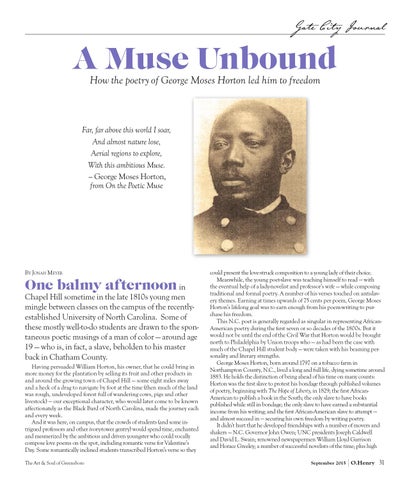Gate City Journal
A Muse Unbound How the poetry of George Moses Horton led him to freedom
Far, far above this world I soar, And almost nature lose, Aerial regions to explore, With this ambitious Muse. — George Moses Horton, from On the Poetic Muse
By Jonah Meyer
One balmy afternoon in
Chapel Hill sometime in the late 1810s young men mingle between classes on the campus of the recentlyestablished University of North Carolina. Some of these mostly well-to-do students are drawn to the spontaneous poetic musings of a man of color — around age 19 — who is, in fact, a slave, beholden to his master back in Chatham County.
Having persuaded William Horton, his owner, that he could bring in more money for the plantation by selling its fruit and other products in and around the growing town of Chapel Hill — some eight miles away and a heck of a drag to navigate by foot at the time (then much of the land was rough, undeveloped forest full of wandering cows, pigs and other livestock) — our exceptional character, who would later come to be known affectionately as the Black Bard of North Carolina, made the journey each and every week. And it was here, on campus, that the crowds of students (and some intrigued professors and other ivory-tower gentry) would spend time, enchanted and mesmerized by the ambitious and driven youngster who could vocally compose love poems on the spot, including romantic verse for Valentine’s Day. Some romantically inclined students transcribed Horton’s verse so they The Art & Soul of Greensboro
could present the love-struck composition to a young lady of their choice. Meanwhile, the young poet-slave was teaching himself to read — with the eventual help of a lady-novelist and professor’s wife — while composing traditional and formal poetry. A number of his verses touched on antislavery themes. Earning at times upwards of 75 cents per poem, George Moses Horton’s lifelong goal was to earn enough from his poem-writing to purchase his freedom. This N.C. poet is generally regarded as singular in representing AfricanAmerican poetry during the first seven or so decades of the 1800s. But it would not be until the end of the Civil War that Horton would be brought north to Philadelphia by Union troops who — as had been the case with much of the Chapel Hill student body — were taken with his beaming personality and literary strengths. George Moses Horton, born around 1797 on a tobacco farm in Northampton County, N.C., lived a long and full life, dying sometime around 1883. He holds the distinction of being ahead of his time on many counts: Horton was the first slave to protest his bondage through published volumes of poetry, beginning with The Hope of Liberty, in 1829; the first AfricanAmerican to publish a book in the South; the only slave to have books published while still in bondage; the only slave to have earned a substantial income from his writing; and the first African-American slave to attempt — and almost succeed in — securing his own freedom by writing poetry. It didn’t hurt that he developed friendships with a number of movers and shakers — N.C. Governor John Owen; UNC presidents Joseph Caldwell and David L. Swain; renowned newspapermen William Lloyd Garrison and Horace Greeley; a number of successful novelists of the time; plus high September 2015
O.Henry 31
